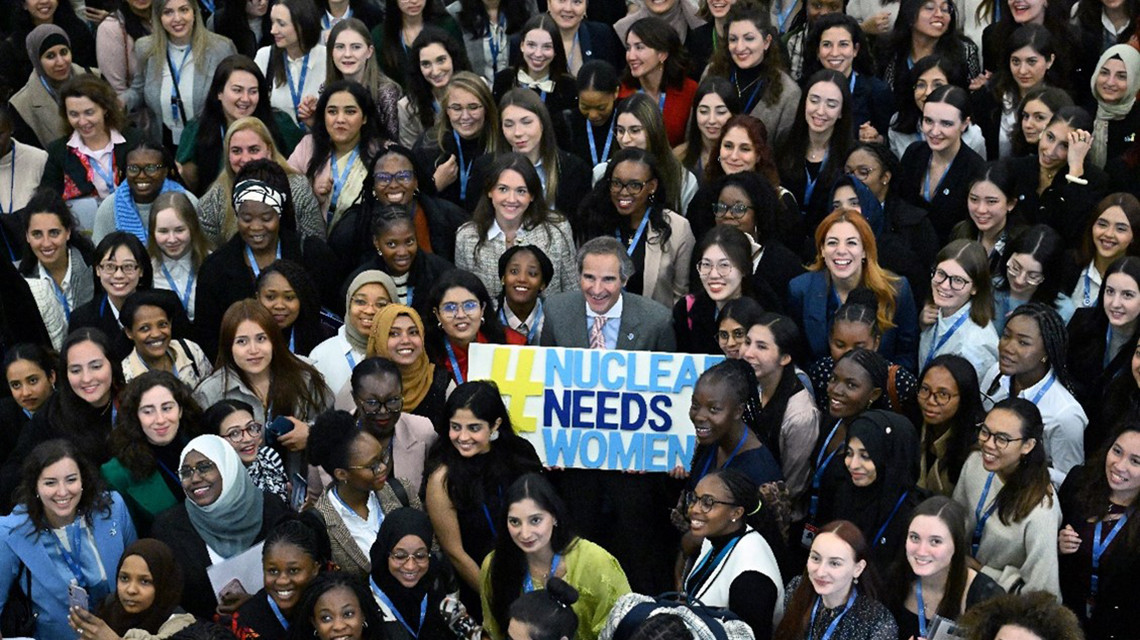Graduates and student of the International Dual Degree M.A. Program “Global Security, Nuclear Policy and WMD Nonproliferation” (MGIMO-MIIS-PIR Center) gathered in Vienna to participate in a discussion on gender balance in the nuclear field.
On March 7-8, 2024, the event For More Women in Nuclear took place at the IAEA headquarters in Vienna, Austria, bringing together more than 400 participants of the IAEA Marie Sklodowska-Curie Fellowship Programme. The event was attended by Ms. Rebecca Pantani, Ms. Océane Van Geluwe, Ms. Sarah Erickson, graduates of the International Dual Degree M.A. Program Global Security, Nuclear Policy and WMD Nonproliferation (MGIMO-MIIS-PIR Center); as well as Ms. Alexandra Zubenko, a student of the 7th cohort.
The IAEA Marie Sklodowska-Curie Fellowship Programme is aimed at supporting women studying in areas related to nuclear technology and research. For example, it helps them partially cover tuition costs, as well as provides a unique opportunity to complete an internship at the IAEA upon graduation. So, Ms. Rebecca Pantani is currently an intern in the Nuclear Security Division of the IAEA Department of Nuclear Safety and Security. Two other graduates of the program also work in the nuclear field: Ms. Océane Van Geluwe is today an EI&C Nuclear Safety Qualification Engineer at AKKODIS Belgium, and Ms. Sarah Erickson holds the position of Research Assistant of the Space Security and Weapons of Mass Destruction Program at UNIDIR. As one of the alumni noted, “studying at the dual degree program gives very good chances to receive a Marie Curie scholarship, since one of the main directions of the program — the nuclear nonproliferation studies — is one of the main directions of the IAEA’s work”.
At the opening ceremony, the participants were welcomed by the Director General of the IAEA Rafael Grossi. He spoke about the selection process, the history of the program and its first results. Mr. Grossi stressed that one of the main goals of this program is to create a “powerful community of women in nuclear”.
In addition, the program of the event also included presentations by speakers on improving gender balance in the nuclear field. According to the IAEA, today only 20% of industry workers are women. In the IAEA itself, this figure is much higher — 46%, which is one of the results of the policy of supporting women in the nuclear and related fields. “When I joined the IAEA in 2019, this figure was about 28%. That’s when my colleagues and I came up with the idea of creating a program that would change these statistics not only at the IAEA, but also around the world”, — Mr. Grossi shared.
Along with South Korea, Great Britain, the United States, and Japan, Russia, in particular Rosatom, is one of the main sponsors of the IAEA Marie Sklodowska-Curie Fellowship Programme. During the panel discussions, representatives of Rosatom talked about their success story in the nuclear field and about measures to support female students of technical specialties in Russia.
In addition, the participants were addressed by Mr. Mikhail Chudakov, Head of the IAEA Department of Nuclear Energy, who noted the important role of women in promoting a positive image of nuclear energy. “Today, one of the main obstacles to the spread of nuclear energy is the public’s fear of atomic energy. It seems to me that if people see more women working in this field, this fear will decrease”, — said Mr. Chudakov.
At the event, the participants also had the opportunity to communicate with representatives of private, public and international companies dealing with nuclear energy or nonproliferation of nuclear weapons.
Key words: Atomic Energy; Nuclear Nonproliferation; Education
NPT
E16/MIN – 24/03/14


